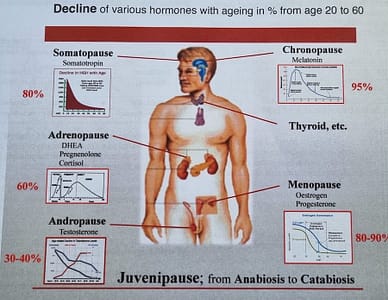KEY Nutrition’s main goal is to enhance the quality of life through nutrition. The right nutrition can reduce and potentially cure disease, help reverse obesity and also help to control- and possibly reversing- certain types of diabetes (Type II).
Dr H Rensburg, a bariatric physician and hormone specialist has delved deep into nutrition, pharmacology, physiology and naturopathy to bring the best advice and therapies to enhancing longevity.
Below is Dr Rensburg excerpt on a ‘drug’ which shows great data on being able to control and prevent type II diabetes. It is strong advised that all medical suggestions below should first be discussed with your own medical doctor before starting anyu protocols listed below.
Dr H Rensburg on Metformin
The following views on metformin are my own and the views of some other colleagues. Despite being technically a drug, Metformin is derived from natural compounds found in Gallega officianalis (“French lilac”), a plant used in Europe since the 16th century as a natural medicine. Its active ingredient is now synthesised in a laboratory. It has a good safety record over many years.
Indications
Metformin is approved for treating diabetes, specifically Type 11 maturity-onset diabetes. Metformin’s mechanism of action is entirely different from that of older anti-diabetic drugs, such as sulfonylureas. The sulfonylureas act to stimulate the release of insulin from the pancreas. The problem is people with type 1 diabetes are already insulin resistant, and they already have too much insulin. Therefore, although sulfonylureas lower blood sugar by elevating insulin still more, they actually worsen the condition by causing even more insulin resistance.
Metformin acts by restoring insulin receptor sensitivity – not only in the muscles but also in the hypothalamus (the central regulator in the brain).
Although Metformin was originally approved for Type II diabetics, I have used it on Type 1, ‘insulin dependent’ diabetics as well. Although Type I diabetics produce insufficient quantities of insulin, they, like the Type II diabetics, are also insulin resistant. Consequently, I recommend that Type I diabetics use Metformin with their insulin. Metformin significantly reduces the wild swings in blood sugar that insulin-dependent diabetics experience, allowing them to use less insulin.
In addition, Metformin is widely recognised as an effective treatment for polycystic ovary syndrome (PCOS). It works equally well for any woman with ovarian cysts
Use in HAS (The Hyper-Adiposity Syndrome, previously known as Obesity)
Metformin is one of the most effective anti-obesity drugs there is. It is a successful agent to help with weight loss. Furthermore, due to the sugar stabilising properties of Metformin, it is also a valuable aid for dieters, helping to prevent sugar cravings and therefore maintain a diet plan.
Use as a geroprotective (longevity and anti-ageing).
Metformin is the most under-appreciated longevity drug today. As we age, we are all becoming diabetic; some of us are just more diabetic than others. I consider Metformin to be a ‘metabolic rejuvenator’. It actually restores our ability to handle carbohydrates to a more youthful state. In addition to normalising blood sugar and insulin, it lowers cortisol, helps to normalise blood pressure, lowers cholesterol and triglycerides, stimulates the release of growth hormone, and enhances the immune system.
Laboratory animals given Metformin live up to 25% longer and have less cancer than the control group. I’ve been recommending Metformin as the most effective geroprotective drug there is. It still holds that distinction. In fact, the Life Extension Foundation recently made that same claim. The Albert Einstein Medical School in NY labelled Metformin a “wonder drug.” Quite recently, Harvard Medical school described it also as a “wonder drug”.
https://www.health.harvard.edu/blog/is-metformin-a-wonderdrug-202109222605
Diabetics use Metformin to increase their body’s receptor sensitivity to insulin. This is important for anti- ageing, because we all lose insulin sensitivity with advancing age (particularly past the age of 40).
With age, insulin/glucose sensitivity continues to decline, which is why we all become diabetic.
Other benefits
Overall, Metformin seems to be a pretty remarkable substance, beneficial for controlling weight, preventing cancer, lowering cholesterol ratios, and possibly even extending life expectancy.
Stabilises cholesterol and lipid profiles.
Metformin is also known to lower cholesterol levels and helps prevent low-density lipoproteins (LDL/ bad cholesterol) from attaching to blood platelets and arteries, thereby reducing the risk of blood clotting. It also lowers triglycerides
Sense of well being
Patients report an enhanced sense of well-being on Metformin with increased energy
Cancer inhibition
Compared to non-cancerous cells, cancer cells have about 15 20 times as many insulin receptors. By lowering insulin levels, metformin makes cancer cells less able to access sugar. Metformin may have other anticancer effects, as seen in laboratory animals. As a whole, Metformin seems to be a remarkable substance.
Potential negative side effects
1. Most patients will experience some nausea initially, but this disappears in a few weeks or less.
2. The only side effect I commonly see with Metformin is stomach upset and diarrhoea. And that only occurs in about 9%. However, if you’re in that 9%, as far as you’re concerned, it’s 100%! I’ve found, however, that almost everyone can build up a tolerance for it. As a starting point, I recommend that patients take one or even half a tablet daily. The dose should be taken for a week or two, and then gradually increased as tolerance develops.
3. There is a theoretical problem of lactic acidosis in patients with impaired kidney function, but I have never seen this in practice, despite monitoring thousands of patients on Metformin. If you have impaired kidney function, you should only take Metformin with the supervision of a physician and have your blood levels of lactic acid checked regularly
4. Some indirect adverse effects:
Due to Metformin’s impairing effect on vitamin B1 and B12 absorption, it’s prudent to take plenty of these vitamins. I don’t have to tell my patients that, of course, as they’re usually already taking plenty of vitamins. It may even be necessary to inject Vit B12 every three months or so if you are taking Metformin long-term.
Metformin has also been shown to raise homocysteine, so extra folic acid and Vitamin B6 should also be taken. Again, not usually necessary for my patients. It can also suppress CoQ10, and it is advisable to supplement with it on long-term Metformin treatment.
Long-term deficiencies of the above B12, CoQ10, etc, can negatively affect your mitochondria, central nervous system, and brain. It is not a direct effect of Metformin but an indirect effect caused directly by these deficiencies. So make sure you have enough of these while on Metformin. Occasionally Metformin can suppress TSH and cause the thyroid tests to change. You may have to lower or increase the dose if you use thyroid medication. Have some blood tests done while on Metformin to check this.
Recommended dosages
I routinely recommend 1,000 to 1,500 mg daily. Although I occasionally recommend as much as 2,000 mg daily. I see little benefit in going any higher than 3,000 mg. However, if someone cannot take doses that high without gastric upset. I recommend they take whatever dose they can tolerate. Don’t make the treatment worse than what we’re trying to treat.
Regular doses for those over 40 years of age are just one tablet (500mg each) once, twice, or three times a day. Consult your physician if you have diabetes, have any liver or kidney problems or have ever suffered from lactic acidosis before use. Stop using if you feel unwell There are also slow-release (SR) tablets lately-so only once a day is necessary to improve compliance, but I do not find them useful in weight loss and probably would not be helpful for Metformin’s other beneficial effects as well.
Special precautions:
Medical supervision is always recommended when taking Metformin. Kidney function, lactic acid, and Vit. B12 levels should be taken periodically, as well as thyroid function tests. If kidney function is compromised due to severe illness, accident, or whatever reason, Metformin should be discontinued until fully recovered.
Results
Metformin is a real life-changing drug for many people. In addition to being one of the most effective weight loss drugs, it has the effect of just making people feel better. The three things I keep hearing over and over from my patients on Metformin are: ‘t feel better; I’ve got more energy, and I’ve lost my carbohydrate cravings.
This whole area of anti-aging (preventative medicine) treatment is clearly very effective. We know of course, that the accumulation of AGE, or Advanced Glycated End products, is much more significant in people with diabetes compared to non-diabetics and that diabetes has often been viewed as a form of accelerated ageing.
Professor Vladimir Dilman is the originator of the Neuroendocrine Theory of Aging. Dilman preceded Reaven by more than ten years, and his concepts went far beyond Reaven’s. Syndrome X is a pattern of hyper- insulinemia, hypertension, and coronary artery disease. Dilman, however, described the ‘metabolic pattern of ageing, which not only includes the elements of Syndrome X, but also incorporates other metabolic changes as well, which are a part of all of the other chronic degenerative diseases.
The linchpin in all of these conditions is hyper- insulinemia, and the loss of hormone receptor sensitivity. Since hyper-insulinemia is involved in the Metabolic Pattern of Ageing, and Metformin normalises insulin, blood sugar, and a number of other age-related parameters, Metformin is a true life-extending drug.
I have been prescribing Metformin since 1981 and have given variations of the above information about Metformin to patients ever since. Recently a large number of studies confirmed the above. It helps to decrease the risk of colon, pancreatic, prostate, and breast cancers.
5 years on Metformin reduces breast cancer risk by 56% (some studies 72%) and pancreatic cancer by 62%, reducing lung cancer in smokers.
Metformin mimics the benefits of adiponectin (a hormone) in activating AMPK-dependent growth inhibition in prostate and colon cancer cells, for instance. Diabetics on Metformin have significantly lower cancer rates than people with diabetes not on it.
Diabetics on Metformin live longer than non-diabetics not on it. Non-diabetics on Metformin live longer than diabetics on Metformin. Metformin is now also given to patients who already have breast, prostate, colon, or pancreatic cancer since it seems to prolong survival and decrease recurrences.
Metformin also seems to decrease the risk of Alzheimer’s disease.
There are several possible mechanisms to explain metformin’s putative benefits on aging. According to researchers, metformin activates AMP- activated protein kinase (AMPK), an enzyme that plays a role in cellular energy homeostasis and reduces inflammation through the suppression of NF-kB via AMPK-dependent pathways. Metformin may also ameliorate DNA and cellular damage by decreasing reactive oxygen species synthesis through reverse electron flux, and by inhibiting mechanistic target of rapamycin (mTOR) pathways, thus reducing oxidative stress.
Additionally, metformin may limit the negative effects of ceramides, thereby preventing myoblast senescence and improving overall tissue health.
And in case you’re worried about how “safe” it is…Metformin is the most studied medication in the history of humankind, with an overwhelming amount of clinical data supporting its efficacy. It is incredibly well-tolerated, making it safe for anyone who takes it.
Bottom Line:
If you are not using Metformin, you’re not doing everything possible to live a fully optimised life!
To summarise
Probably everyone over 35 should be taking Metformin for the above purposes. If you wait until you are ready, it is almost certainly too late.
Dr. Hendrik v Rensburg MA. MB.Bch. BAD. (TCD) M.R.CS. (Eng) LR.CP. (Lond)
Faculty Member of the International Hormone Society (IHS) The Rensburg Clinic 08 9444 1766
References:
Too numerous to list, but can be supplied on request. Only some of the medical reports of the last few years:
Diabetes drug have cancer uses United Press International 09-03-10An ancient herbal remedy whose active ingredient is the main constituent of a modern diabetes drug may help combat cancer, two US studies show. The studies, published in the journal Cancer Prevention Research, support previous research that found diabetes patients receiving the drug metformin are less prone to developing cancer.
Diabetes drug may help Alzheimer’s patients dpa Deutsche Presse-Agentur (dpa) 12-13-10 Ernest Gill, Berlin (dpa)-A common medication used in type 2 diabetes might have the potential to also act against Alzheimer’s disease. This is the result of a study by scientists of the German Centre for Neurodegenerative Diseases (DZNE) in Bonn, the University of Dundee and the Max-Planck-Institute for Molecular Genetics in Berlin. The researchers found that the diabetes drug metformin counteracts alterations of the cell structure protein tau in mice nerve cells. These alterations are a main cause of Alzheimer’s disease. They also uncovered the molecular mechanism of metformin in this process.
Metformin shows anticancer effect in early breast cancer patients Tuesday, July 23, 2013. The results of a study of the diabetes drug metformin in non-diabetic women with early breast cancer indicate that the drug may provide an anticancer effect in addition to other benefits when given during a window of opportunity. The findings were reported in the October 2012 issue of the journal Breast Cancer Research and Treatment
Study affirms metformin as first-line treatment 13 August, 2014 Type 2 diabetes patients treated with metformin live slightly longer on average than people without the condition, according to a large observational study that backs the drug as a safe first-line treatment.
Diabetes pills costing just 2p each could give men’s love lives a lift By PAT HAGAN PUBLISHED: 22-27 GMT. 9 September 2013 | UPDATED: 22:41 GMT. 9 September 2013 Uplift: Scientists think a drug used to treat patients with type 2 diabetes may also work as an alternative to anti-impotence drugs like Viagra or Cialis Tablets costing just 2p each could be a new treatment for men with erection problems. New research suggests the medicine, called metformin, could boost a man’s performance
in the bedroom. The drug has been widely used on the NHS for many years to treat patients with type 2 diabetes.
Diabetes drug could treat leading cause of blindness: study mXinhua News Agency-CEIS 05-09-12 Diabetes drug could treat leading cause of blindness: study WASHINGTON, May 7 (Xinhua) – US researchers have discovered that a drug already prescribed to millions of people with diabetes could also have another important use treating one of the world’s leading causes of blindness.
Metformin shows anticancer effect in early breast cancer patients Tuesday, July 23, 2013. The results of a study of the diabetes drug metformin in non-diabetic women with early breast cancer indicate that the drug may provide an anticancer effect in addition to other benefits when given during a “window of opportunity.” The findings were reported in the October 2012 issue of the journal Breast Cancer Research and Treatment.
Metformin could help women with PCOS avoid weight gain Glintborg D. J Clin Endocrinol Metab. 2014, doi:10.1210/jc.2014-1135 August 27, 2014 Body composition in women with polycystic ovary syndrome demonstrating central obesity and insulin resistance improved with metformin, according to research published in The Journal of Clinical Endocrinology & Metabolism.
Lower risk of dying from any cause over 4.64-year median follow-up period in prostate cancer patients who used metformin Tuesday, August 13, 2013. In an article published online on August 5, 2013 in the Journal of Clinical Oncology, researchers from Toronto report a lower risk of mortality among prostate cancer patients with diabetes who were being treated with the anti-diabetic drug metformin in comparison with those who were not being treated with the drug.





